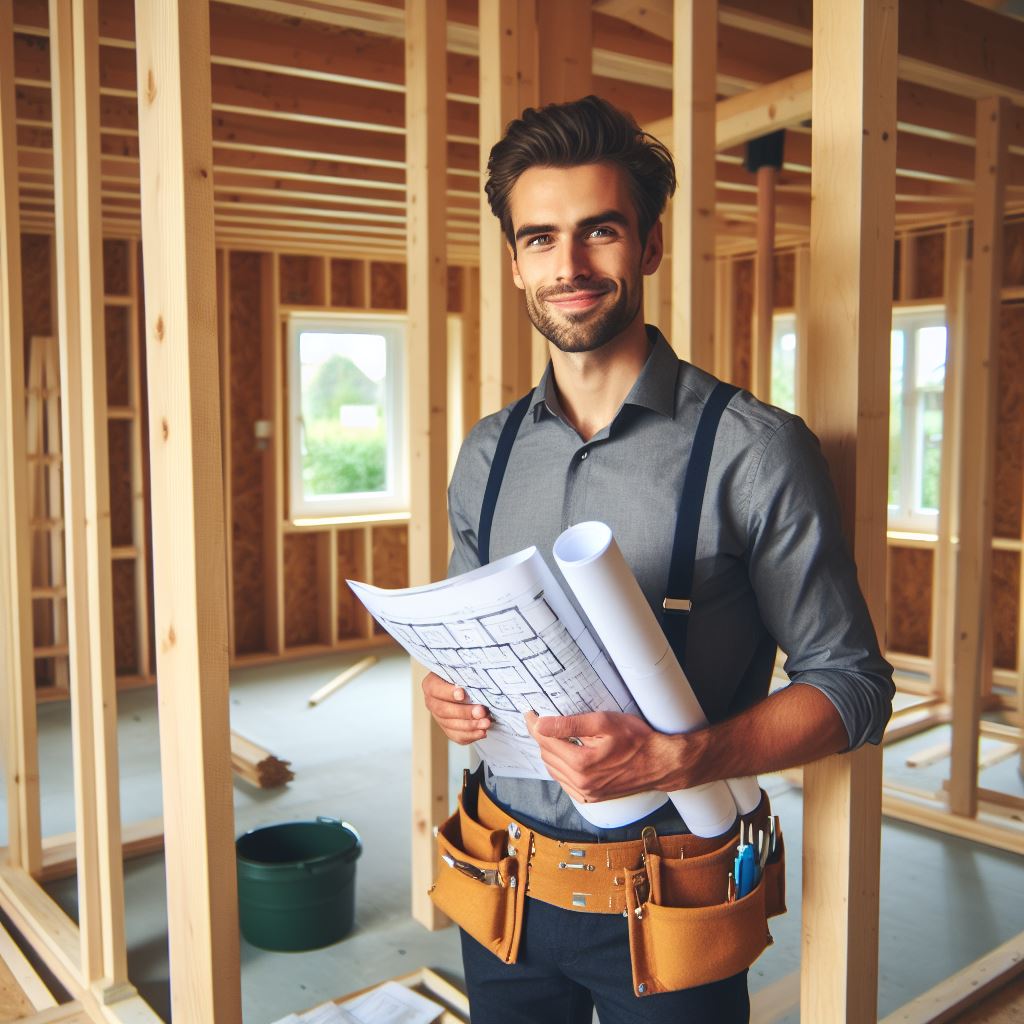Introduction
Building permits play a crucial role in the construction industry by ensuring that buildings are built safely and in compliance with local regulations.
These permits are required for any construction or renovation work, and failing to obtain them can result in costly fines or even legal trouble.
Therefore, understanding the importance of building permits is essential for homeowners and contractors alike.
The purpose of this blog post is to provide readers with a comprehensive guide to residential building permits.
Whether you are planning a home renovation or starting a construction project, this post will help you navigate the permit process effectively.
From understanding the types of permits to identifying the necessary documentation, we will cover all the essential aspects.
By following the information provided in this blog, readers can ensure a smooth permit application process, saving both time and money.
We will also highlight the consequences of proceeding without the required permits, emphasizing the importance of compliance.
Moreover, we will provide practical tips for expediting the permit approval process and avoiding common mistakes.
In fact, building permits are not just bureaucratic red tape; they are crucial to ensuring the safety and legality of construction projects.
This blog post aims to guide readers through the complexities of residential building permits, empowering them to embark on their projects with confidence and compliance.
Stay tuned for our next section, where we delve into the different types of permits and their specific requirements.
What are Residential Building Permits?
In this section, we will discuss what residential building permits are, their definition, purpose, and the different types of permits that exist.
Definition and Purpose
Residential building permits are official documents issued by the local government that grant legal permission to build or renovate residential properties.
The purpose of these permits is to ensure that construction or renovation projects comply with safety regulations and building codes.
Transform Your Real Estate Decisions
Unlock personalized real estate insights crafted just for you. Get actionable advice designed to amplify your success.
Get StartedDifferent types of residential building permits
New Construction
A new construction permit is required when building a residential property from scratch, starting with an empty lot.
Renovation or Remodeling
For renovating or remodeling an existing residential property, a permit is necessary to ensure compliance with updated building codes.
Additions or Extensions
When making additions or extensions to a residential property, such as adding a new room or expanding a kitchen, a permit is required.
Obtaining the necessary permits before starting any construction project is crucial for several reasons.
Firstly, it helps ensure the safety of the occupants by guaranteeing that the construction meets safety standards.
Secondly, it protects the rights and interests of homeowners, ensuring that their investment is legally compliant.
Additionally, having the required permits can help prevent costly delays and fines that may arise if construction is done without proper authorization.
By obtaining permits, homeowners can also avoid potential legal issues and complications with insurance companies or future property sales.
In short, residential building permits are crucial for any construction, renovation, or remodeling project.
They not only contribute to the safety and well-being of occupants but also protect homeowners’ investments.
Understanding the different types of permits and their purpose is essential to ensure compliance with local building codes and regulations.
Therefore, it is advisable to consult with local authorities or professionals in the field to navigate the permit application process successfully.
Read: From Shabby to Chic: A Cottage’s Tale
Why are Building Permits Required?
In this blog section, we will explore the reasons why building permits are required.
Showcase Your Real Estate Business
Publish your company profile on our blog for just $200. Gain instant exposure and connect with a dedicated audience of real estate professionals and enthusiasts.
Publish Your ProfileEnsuring compliance with safety codes
- Building permits help ensure that construction projects adhere to safety codes and regulations.
- These codes are put in place to protect the health and safety of occupants and the public.
- By obtaining a permit, the project undergoes inspections to confirm compliance, ensuring a safe living environment.
Protecting property owners
- Building permits offer protection to property owners by guaranteeing that contractors follow proper guidelines.
- Permits require contractors to have proper licenses and insurance, minimizing liability for property owners.
- Without a permit, property owners risk employing unqualified professionals and facing potential hazards or poor workmanship.
Maintaining quality standards
- Building permits promote quality standards by enforcing rules on materials, construction methods, and engineering.
- These standards help ensure that structures are built to withstand environmental factors and stand the test of time.
- Maintaining quality standards leads to long-lasting, safe, and structurally sound buildings in residential areas.
Avoiding legal and financial implications
- Obtaining a building permit helps property owners avoid legal issues and potential fines.
- Unauthorized construction can result in penalties, project delays, and even demolition of the structure.
- Permits also play a crucial role when selling the property, as buyers often require proof of permit compliance.
Building permits have become a prerequisite for any construction project in most jurisdictions.
They serve various purposes, ranging from ensuring compliance with safety codes to protecting property owners from potential liabilities.
By requiring permits, authorities maintain quality standards in residential areas, leading to a safer and structurally sound environment.
Read: Eco-Friendly Building: Permits and Codes

Steps to Obtain Residential Building Permits
Achieving all the necessary permits for constructing a residential building can be a complicated process.
Follow these steps to ensure a smooth permit acquisition:
Research local requirements
- Check your local building department’s website for specific permit requirements.
- Understand the regulations and guidelines concerning your desired construction project.
- Identify any special conditions or restrictions that you need to adhere to.
- Consider consulting with a professional to clarify any doubts and ensure compliance.
Complete necessary paperwork
- Obtain the required permit application forms from the building department or their website.
- Ensure that all sections of the application are filled accurately and completely.
- Include detailed information about the construction project, such as size, location, and scope.
- Provide any supporting documents that are required, such as property surveys or HOA approvals.
Permit application
Fill out the permit application form with your personal, project, and property details.
Construction plans
Submit detailed construction plans, including architectural and structural drawings, to illustrate the proposed work.
Inspection requests
Indicate the desired inspection points and stages throughout the construction process.
Paying associated fees
- Calculate the applicable permit fees based on the type and scale of your residential project.
- Prepare the required payment and ensure all fees are paid according to the building department’s guidelines.
- Consider any additional fees for plan reviews, impact fees, or special permits.
Submitting the application
- Compile all the completed paperwork, including the permit application, construction plans, and fee receipts.
- Ensure that all documents are organized and in proper order.
- Last, submit the application package to the appropriate building department.
Waiting for approval
Once the application is submitted, the waiting period for approval may vary depending on several factors:
- Workload and backlog of the building department.
- Complexity and size of the project.
- Compliance with all local building codes and regulations.
During this waiting period, it is essential to refrain from starting any construction until the permit is officially approved.
Obtaining residential building permits requires diligent research, careful preparation of paperwork, and adherence to local regulations.
By following these outlined steps, you can navigate through the permit acquisition process with greater ease and efficiency.
Read: Living Room Revival: Stylish Renovation Tales
See Related Content: Green Building Materials: What’s Trending?
Common Mistakes and Challenges with Building Permits
Failure to obtain permits
- Building without the necessary permits can result in legal issues.
- Failure to obtain permits may lead to penalties and fines.
- Building without permits can also lead to having to undo or modify construction work.
- Not acquiring permits can cause problems when trying to sell the property.
- Always ensure that you have obtained the required permits before starting any construction.
Errors in paperwork or plans
- Submitting incorrect paperwork or plans may delay the approval process.
- Double-check all paperwork to ensure accuracy and completeness.
- Errors in plans can lead to construction that does not meet building codes.
- Any errors or omissions in paperwork should be promptly corrected and resubmitted.
- Working with a professional can help minimize errors in paperwork and plans.
Delays in the approval process
- The approval process can take longer than expected due to various factors.
- Insufficient documentation or incomplete applications can cause delays in the approval process.
- Changes or revisions required by the permitting authority can prolong the approval process.
- Applying for permits well in advance can help mitigate delays in the approval process.
- Regularly following up with the permitting authority can help expedite the approval process.
Addressing objections or revisions
- The permitting authority may raise objections or request revisions to your proposed construction.
- Address objections or revisions by providing additional information or modifying plans accordingly.
- Engage in open and clear communication with the permitting authority to resolve any objections.
- Do not ignore objections or revisions, as they may prevent the approval of your building permits.
- Seek professional help if you are unsure about addressing objections or incorporating revisions.
Building permits can be a complex and challenging aspect of residential construction.
However, by being aware of the common mistakes and challenges, you can navigate the process more efficiently.
Ensure you obtain the necessary permits, double-check all paperwork and plans for accuracy, and address any objections or revisions promptly.
By avoiding these pitfalls, you can successfully obtain the required permits and proceed with your construction project smoothly.
Read: Commercial vs. Residential Permits Explained
Benefits of Obtaining and Complying with Building Permits
In the realm of residential construction, the journey doesn’t end with the architectural plans or groundbreaking.
Securing the necessary permits plays a pivotal role in the success of any building project.
In this section, we delve into the invaluable benefits of obtaining and complying with building permits.
Insurance Coverage
One of the often overlooked advantages of obtaining building permits is the potential impact on insurance coverage.
In the unfortunate event of unforeseen incidents such as fire, floods, or other disasters, having the proper permits can streamline the insurance claims process.
Insurance providers may be hesitant to cover damages resulting from work conducted without the necessary permits.
By adhering to the permitting process, homeowners ensure that their investments are safeguarded against unforeseen risks.
Property Value Increase
Building permits contribute significantly to enhancing the overall value of a property.
Potential buyers are increasingly conscious of the legalities surrounding a residence.
A home with a documented history of compliance and adherence to building codes is inherently more attractive to prospective purchasers.
Showcase Your Real Estate Business
Publish your company profile on our blog for just $200. Gain instant exposure and connect with a dedicated audience of real estate professionals and enthusiasts.
Publish Your ProfileThis elevated perceived value can translate into a higher selling price, offering homeowners a return on their initial investment in the permitting process.
Resale Advantages
When it comes time to sell a property, having a well-documented and compliant construction history can be a game-changer.
Prospective buyers often view homes with a comprehensive set of building permits as a sign of quality and durability.
It also provides them with confidence that the property has been constructed and modified in line with established regulations.
This positive perception can expedite the sale process and potentially result in a more lucrative deal for the seller.
Peace of Mind for Property Owners
Perhaps the most significant benefit of all is the peace of mind that comes with obtaining and complying with building permits.
Knowing that a home has been built or renovated with the proper approvals ensures that it meets the required safety standards.
This sense of security is invaluable for property owners, allowing them to enjoy their homes without the nagging worry of potential legal or safety issues.
Basically, the benefits of obtaining and complying with building permits extend far beyond mere legalities.
They encompass financial security, increased property value, resale advantages, and most importantly, peace of mind for property owners.
Embracing the permitting process is not just a legal obligation but a strategic investment in the long-term success and well-being of a residential property.
Conclusion
Throughout this guide, we have emphasized the importance of residential building permits.
These permits ensure that construction projects comply with local regulations and safety standards, protecting both homeowners and communities.
Obtaining a residential building permit may seem like a daunting process, but it is essential for a successful construction project.
It helps prevent costly mistakes, reduces the risk of legal issues, and ensures that the work meets the required standards.
While this guide provides a comprehensive overview, it is always advisable to seek professional assistance when dealing with complex building permit requirements.
Architects, contractors, or even permit expeditors can provide expert guidance and facilitate the permit application process.
In the end, residential building permits are the cornerstone of safe and legal construction.
By obtaining the necessary permits, homeowners can have peace of mind, knowing that their projects are compliant with regulations.
Remember, it is always better to take the necessary time and effort to ensure that all permits are in order before starting any construction work.




